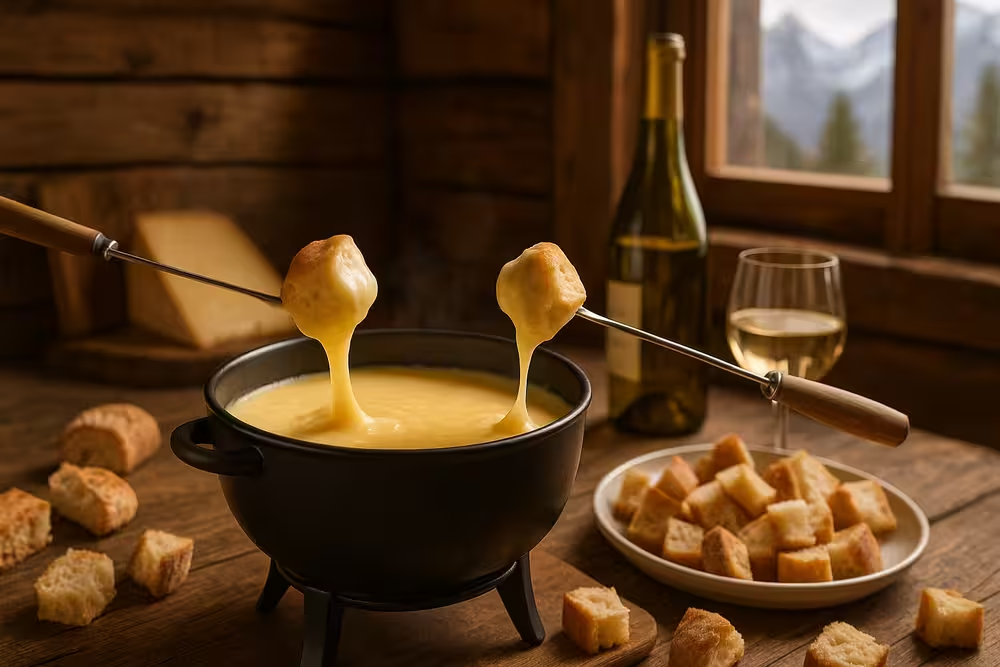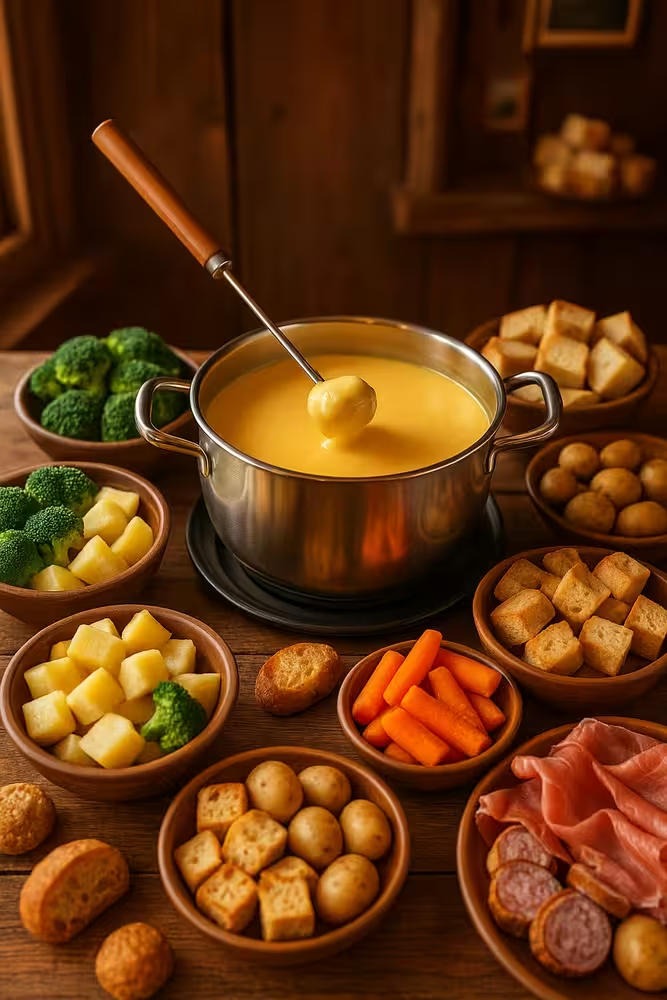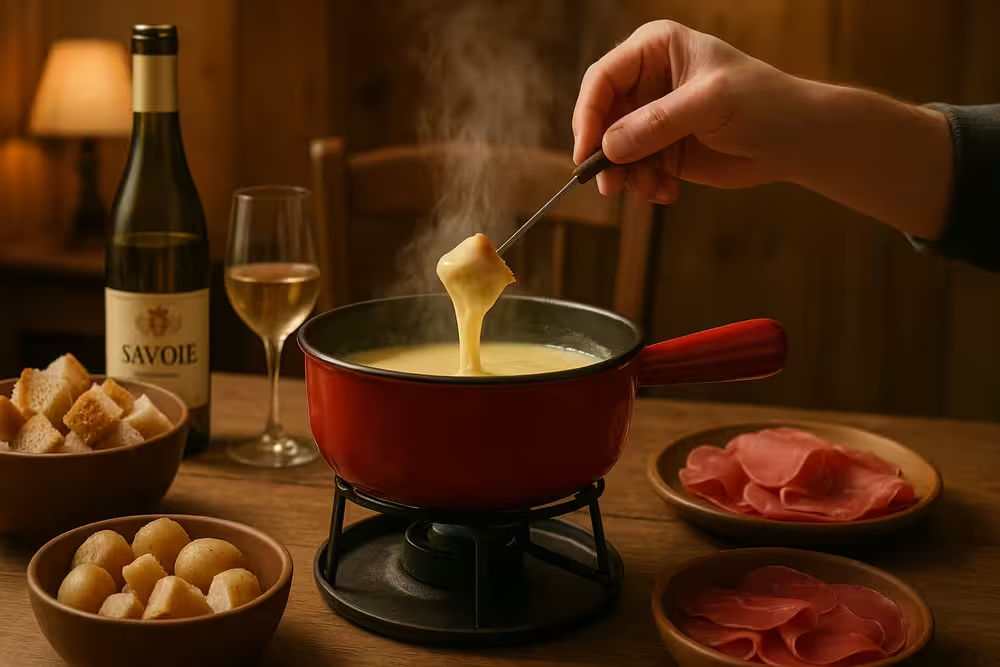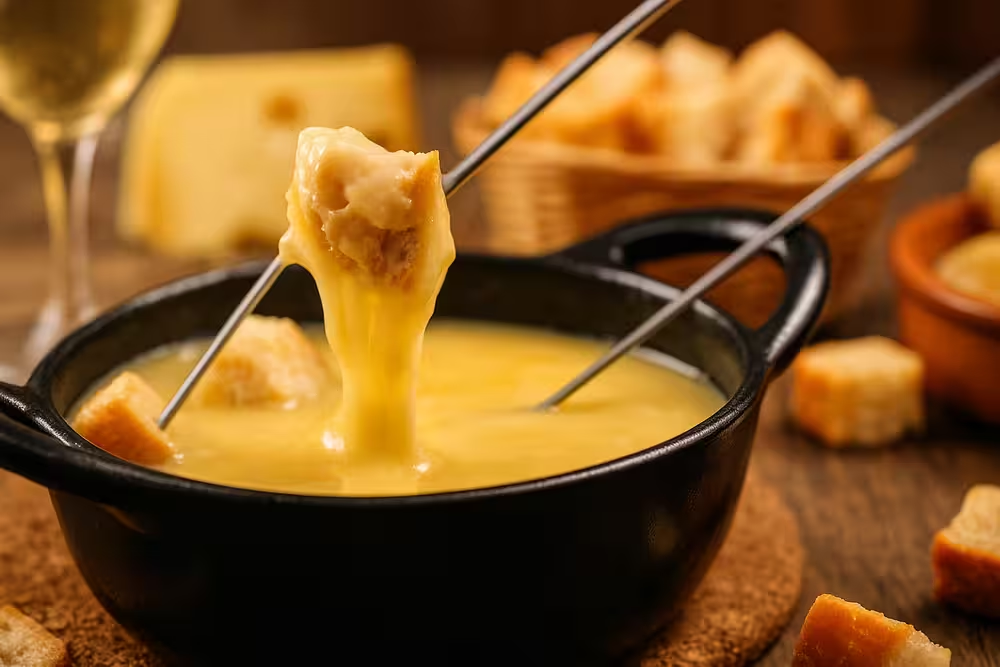How to make a successful Savoyard fondue at home: tips and advice
How to make a successful Savoyard fondue at home: discover the traditional recipe, the right cheeses, tips and advice for a convivial, melt-in-your-mouth meal with family and friends.
- Home |
- How to make a successful Savoyard fondue at home: tips and advice
How to make a successful Savoyard fondue at home: tips and advice
Introduction
How to make a successful Savoyard fondue at home: traditional recipe, practical advice, cheeses, ingredients and tips for a successful, easy and convivial Savoyard fondue.

Melt-in-the-mouth, generous, convivial: Savoyard fondue is much more than a simple winter dish. It's a ritual, an experience to be shared, a promise of warmth and pleasure around the table. But how to make a successful Savoyard fondue at home: tips and advice are essential to mastering the right gestures and choosing the right cheeses. Traditional recipes, essential ingredients, tips and mistakes to avoid... everything you need to sublimate this great classic of mountain cuisine. Treat yourself to an authentic moment and discover how to turn a simple evening into a real feast of taste.

How to make a successful Savoyard fondue at home: tips and advice
Homemade Savoyard fondue recipe: key steps
Choosing the right cheeses: Comté, Beaufort and Emmental The success of a Savoy fondue begins with a careful selection of cheeses. Three varieties are the traditional staples: Comté for its fruity sweetness, Beaufort for its assertive character, and Emmental de Savoie for its melt-in-the-mouth texture. The right balance between these cheeses guarantees perfect creaminess and a rich taste without excess. Ideally, they should be finely grated to facilitate their melting in the fondue pot. For a successful fondue at home, the origin and quality of the cheeses are paramount. Favoring local producers or specialized cheese dairies brings real taste value.
Preparing your fondue pot and the right utensils The right equipment makes all the difference. The caquelon, preferably in enamelled cast iron or thick ceramic, ensures even heat distribution. It should be placed on a stable stove to maintain temperature without boiling. A wooden spoon with a long, sturdy handle is ideal for stirring without damaging the bottom of the container. Fondue picks should be marked or colored to avoid confusion at the table. These simple but essential items are essential to the success of your Savoyard fondue at home.
The right proportions and temperatures Quantities play a decisive role. Count on around 200 to 250 grams of cheese per person. To bind the cheeses, a dry white Savoy wine such as Apremont or Roussette is ideal. It should be added at the beginning of cooking, before the cheese is gradually introduced, while stirring constantly. The temperature must remain constant and moderate, to prevent the fat from separating. A pinch of cornstarch can be added to stabilize the emulsion. Garlic rubbed into the bottom of the caquelon, although optional, adds a subtle aromatic note. Mastering these gestures ensures a smooth, melting and irresistible texture.
Here's how to make a success of your Savoyard fondue at home: tips and tricks come into their own.
How to make a successful Savoyard fondue at home: tips and advice
Cheeses for Savoyard fondues: how to select them correctly
Traditional Savoy cheeses Savoy fondue draws its authenticity from the choice of cheeses from the Alps. The classic trio remains unchallenged: Comté, Beaufort and Emmental de Savoie. Each brings its own unique taste signature. Long-ripened Comté releases sweet, fruity notes. Beaufort, nicknamed the prince of Gruyère cheeses, offers powerful aromas and a creamy texture. As for Emmental, it guarantees the elasticity and lightness of the preparation. For a successful homemade Savoyard fondue recipe, respecting this balance is essential. These cheeses complement each other, melting perfectly together and giving fondue the creaminess for which it is famous.
Variations for a touch of originality The more daring can vary the pleasures by replacing one of the traditional cheeses with a more local or atypical version. Reblochon, for a milder note, Tomme de Savoie for its rustic character, or Abondance for a fuller-bodied taste. These substitutions allow you to personalize your fondue while preserving its structure. You can also add a hint of blue cheese or goat's cheese, in very small quantities, to surprise your taste buds. These variants offer great creative freedom, without betraying the mountain spirit of this convivial dish. A successful fondue at home also means daring to adapt it to your own tastes, while respecting the basics.
Where to buy your cheeses for optimum quality The quality of the cheeses you buy directly affects the success of your Savoyard fondue. We recommend buying from trusted cheesemakers, local cooperatives or mountain markets. Avoid pre-shredded industrial cheeses, which are often too dry and lacking in flavor. Asking an artisan for advice can also help you adjust the proportions according to the degree of ripening. Many online cheese shops now offer special fondue kits with a balanced blend.
For a successful Savoyard fondue at home, every ingredient counts. Even a small amount of the wrong cheese can spoil the final harmony. The secret of a tasty fondue always starts with the right choice at the counter.
How to make a successful Savoyard fondue at home: tips and advice
Tips for a successful Savoyard fondue at home
Avoiding lumps: simple techniques and gestures A Savoyard fondue, to reveal all its deliciousness, must have a homogenous, smooth, creamy texture. To achieve this, cheese must never be added all at once. It's essential to add it gradually to the mulled wine, over a low heat, stirring constantly. A wooden spoon is ideal for making figure-of-eight movements, promoting a smooth, complete fusion. The addition of a teaspoon of cornstarch, previously diluted in a little cold wine, can also stabilize the mixture and prevent the formation of lumps. These simple yet precise gestures are often the key to a successful Savoyard fondue at home.
The art of mixing and melting slowly Patience is an invisible but indispensable ingredient. A fondue cannot be rushed. The dry white wine, chosen from the best quality, must be simmered but never boiled before the cheese is added. Too high a temperature risks breaking the emulsion and causing the fat to separate. Each addition of cheese must melt completely before the next is added. This slow build-up ensures a velvety, even texture. The use of a stable, adjustable stove is highly recommended, both for cooking and for serving. Keeping the fondue hot without burning it prolongs the pleasure without altering the taste. These little touches make all the difference.
The right accompaniments for fondue: bread, white wine, garnishes The pleasure of a fondue also lies in its surroundings. Bread, for example, must be chosen with care. A dense, lightly shaved crumb holds well on the spike and absorbs the melted cheese perfectly. Farmhouse bread, sourdough or even diced walnut bread are valuable allies. As for beverages, a dry white Savoy wine - such as Jacquère or Abymes - is the ideal match for the milky flavours of the dish.
Finally, to balance the meal, a few light garnishes can be offered: crisp green salad, gherkins, cured ham or steamed potatoes. These elements enrich the experience without weighing it down. Making a success of your Savoyard fondue at home also means taking care of the atmosphere and the accompaniments that surround it.
How to make a successful Savoyard fondue at home: tips and advice
Cheese fondue cooking tips: what not to do ?
Common pitfalls in cooking and preparation Even the most motivated cooks can fail to make a Savoyard fondue if they ignore a few essential principles. The first classic mistake: overheating. High heat burns the bottom, separates the fat and gives the cheese a bitter taste. Second pitfall: using sweet or low-quality wine. Carefully selected dry white wine is essential to bind the flavours together. Finally, never add salt to the preparation. Cheeses are already rich enough in salt, and adding more easily throws the whole thing off balance. A failed fondue is often the result of haste. Respecting the steps, the temperature and the quality of the products is already 80% successful.
Storing leftovers and reusing It's rare for a Savoy fondue to leave any leftovers, but if it does, don't throw them away. Once cooled, the preparation can be stored in an airtight container in the refrigerator for 48 hours. It can then be reheated over very low heat with a little milk or white wine to restore its melt-in-the-mouth texture. Better still, use it in gratins, baked toast or as the base for a cheese sauce. Another tip: the crust at the bottom of the caquelon, known as the religieuse, can be eaten hot and crisp. It's a rustic, tasty treat that connoisseurs never pass up.
Adapt the recipe according to the number of guests The success of your Savoyard fondue at home also depends on good quantity management. Too little cheese for too many guests, and the conviviality collapses. In general, you should allow 200 to 250 g of cheese per person, adjusted according to appetite. For a dinner party of four, plan on around 800 g of cheese and 20 to 25 cl of wine. Adapting the size of the fondue pot, the power of the stove and the number of spades will ensure a smooth, enjoyable tasting experience.
Too many people around a small fondue pot quickly becomes chaotic. With the right planning, everyone can enjoy a smooth, hot fondue without waiting. A logistical detail that transforms the meal into a perfect moment.
Conclusion
How to make a successful Savoyard fondue at home: tips and advice becomes child's play when you master the right ingredients, the right gestures and the accompaniments that make all the difference. Quality cheeses, a traditional Savoyard fondue recipe, the right utensils and invaluable tips transform a simple meal into a warm, gourmet experience. This iconic dish unites, comforts and delights with every bite. Want to extend your culinary adventure? Discover our Savoyard recipe ideas, cooking tips and mountain inspirations to make your guests melt with pleasure. Click here to explore all our tasty dossiers.
Articles that may interest you
Discover the resort
Our selection of restaurants in Les 2 Alpes
Our selection of stores in Les 2 Alpes
Movies, bowling, laser tag: your indoor activities
Ski schools: our selection
Frequently asked questions
Find answers to the most common questions about our products. Julia ensures transparency, efficiency, and detailed information in everything we do.

Discover tips, trends and ideas to help you prepare for your stay in the mountains, and discover fantastic places and addresses. Julia and the team regularly prepare new articles for you, so don't hesitate to visit our blog regularly.
Find the best moments from your article









